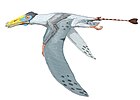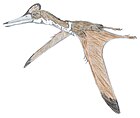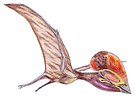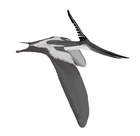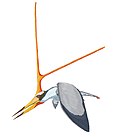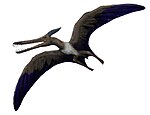Akharhynchus
| Akharhynchus Temporal range: 'mid'-Cretaceous,
| |
|---|---|

| |
| 3D scan of the holotype | |
| Scientific classification | |
| Domain: | Eukaryota |
| Kingdom: | Animalia |
| Phylum: | Chordata |
| Order: | †Pterosauria |
| Suborder: | †Pterodactyloidea |
| Family: | †Anhangueridae |
| Subfamily: | †Tropeognathinae |
| Genus: | †Akharhynchus Jacobs, Smith & Zouhri, 2024 |
| Species: | †A. martilli
|
| Binomial name | |
| †Akharhynchus martilli Jacobs, Smith & Zouhri, 2024
| |
Akharhynchus (meaning "another snout") is an extinct genus of tropeognathine pteranodontoid pterosaurs possibly from the Cretaceous Kem Kem Group of Morocco. The genus contains a single species, A. martilli, known from a small fragment of the premaxillae.
Discovery and naming
[edit]The Akharhynchus holotype specimen, FSAC-KK 12500, was collected by a commercial fossil dealer from an indeterminate locality in sediments of the Kem Kem Group near Tafilalt, Morocco. Based on the matrix it is preserved in and comparisons with other specimens, it presumably originates from the upper Ifezouane Formation, like many other Kem Kem pterosaurs. The specimen consists of a small broken premaxilla fragment.[1]
In 2024, Jacobs, Smith & Zouhri described Akharhynchus martilli as a new genus and species of tropeognathine pterosaurs based on this fragmentary specimen. The generic name, Akharhynchus, combines the Arabic word akhar, meaning "another", with the Greek word rynchus, meaning "snout". The specific name, martilli, references paleontology researcher David Martill.[1]
Akharhynchus is one of at least ten purportedly distinct pterosaur genera recovered from the Kem Kem Group. About half of these are ornithocheirids. Besides Akharhynchus, these include Anhanguera, Coloborhynchus, Ornithocheirus, and Siroccopteryx.[1] Discussions on Kem Kem pterosaurs have noted the problematic practice of naming taxa based on such fragmentary remains, even in the presence of seemingly diagnostic characters. As every pterosaur from these localities is established based on fragmentary rostral and mandibular remains, detailed comparisons are limited. Consequently, the effects of sexual dimorphism and ontogenetic and interspecific variation on perceived diversity are challenging to identify.[2]
Classification
[edit]In their phylogenetic analyses, Jacobs, Smith & Zouhri (2024) recovered Akharhynchus as a tropeognathine member of the Anhangueria, as the sister taxon to the contemporary Siroccopteryx, which is anatomically alike and similarly fragmentary. These two genera form a clade with the South American Tropeognathus.[3] In turn, the clade formed by these genera is sister to one comprising a polytomy of Australian tropeognathines typically referred to as the Mythungini.[4] The results of their analyses are displayed in the cladogram below:[1]
References
[edit]- ^ a b c d Jacobs, Megan L.; Smith, Roy E.; Zouhri, Samir (2024). "A new ornithocheirid pterosaur (Pterosauria: Ornithocheiridae) from the mid-Cretaceous Ifezouane Formation, Kem Kem Group of Morocco". Cretaceous Research (in press): 106015. doi:10.1016/j.cretres.2024.106015.
- ^ Smith, Roy E.; Ibrahim, Nizar; Longrich, Nicholas; Unwin, David M.; Jacobs, Megan L.; Williams, Cariad J.; Zouhri, Samir; Martill, David M. (2023-02-04). "The pterosaurs of the Cretaceous Kem Kem Group of Morocco". PalZ. 97 (3): 519–568. doi:10.1007/s12542-022-00642-6. ISSN 0031-0220.
- ^ Holgado, Borja; Pêgas, Rodrigo (2020). "A taxonomic and phylogenetic review of the anhanguerid pterosaur group Coloborhynchinae and the new clade Tropeognathinae". Acta Palaeontologica Polonica. 65. doi:10.4202/app.00751.2020.
- ^ Richards, Timothy; Stumkat, Paul; Salisbury, Steven (6 October 2023). "A second specimen of the pterosaur Thapunngaka shawi from the Lower Cretaceous (upper Albian) Toolebuc Formation of North West Queensland, Australia". Cretaceous Research. doi:10.1016/j.cretres.2023.105740. Retrieved 7 October 2023.





